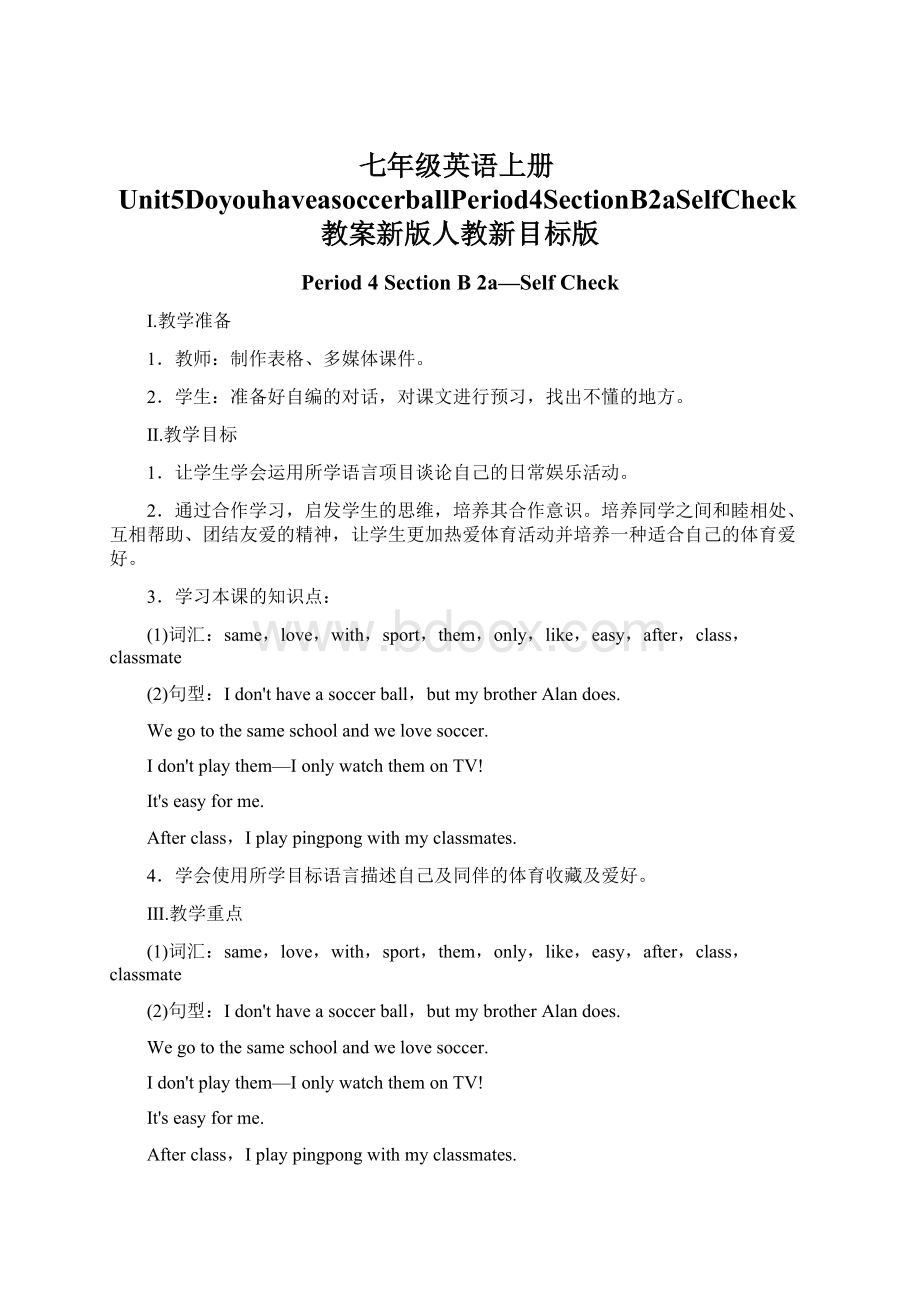七年级英语上册Unit5DoyouhaveasoccerballPeriod4SectionB2aSelfCheck教案新版人教新目标版.docx
《七年级英语上册Unit5DoyouhaveasoccerballPeriod4SectionB2aSelfCheck教案新版人教新目标版.docx》由会员分享,可在线阅读,更多相关《七年级英语上册Unit5DoyouhaveasoccerballPeriod4SectionB2aSelfCheck教案新版人教新目标版.docx(10页珍藏版)》请在冰豆网上搜索。

七年级英语上册Unit5DoyouhaveasoccerballPeriod4SectionB2aSelfCheck教案新版人教新目标版
Period4SectionB2a—SelfCheck
Ⅰ.教学准备
1.教师:
制作表格、多媒体课件。
2.学生:
准备好自编的对话,对课文进行预习,找出不懂的地方。
Ⅱ.教学目标
1.让学生学会运用所学语言项目谈论自己的日常娱乐活动。
2.通过合作学习,启发学生的思维,培养其合作意识。
培养同学之间和睦相处、互相帮助、团结友爱的精神,让学生更加热爱体育活动并培养一种适合自己的体育爱好。
3.学习本课的知识点:
(1)词汇:
same,love,with,sport,them,only,like,easy,after,class,classmate
(2)句型:
Idon'thaveasoccerball,butmybrotherAlandoes.
Wegotothesameschoolandwelovesoccer.
Idon'tplaythem—IonlywatchthemonTV!
It'seasyforme.
Afterclass,Iplaypingpongwithmyclassmates.
4.学会使用所学目标语言描述自己及同伴的体育收藏及爱好。
Ⅲ.教学重点
(1)词汇:
same,love,with,sport,them,only,like,easy,after,class,classmate
(2)句型:
Idon'thaveasoccerball,butmybrotherAlandoes.
Wegotothesameschoolandwelovesoccer.
Idon'tplaythem—IonlywatchthemonTV!
It'seasyforme.
Afterclass,Iplaypingpongwithmyclassmates.
Ⅳ.教学难点
1.养成良好的阅读习惯,掌握适当的阅读策略。
2.运用所学内容写出自己及同伴的体育爱好及收藏,适当的使用连词表示顺序和逻辑关系。
Ⅴ.教学步骤
Step1:
Greetingsandtalking
1.师生问好。
2.自由交际:
建议1:
教师与学生交际训练。
教师可以创设一个情景与学生讨论活动方式,运用所学语言进行问答练习。
建议2:
学生之间进行交际训练。
让学生利用所学过的语言项目来谈论活动安排。
Step2:
Revision
建议1:
通过师生问答,复习上一课时所学的语言项目:
建议教师利用多媒体呈现一个任务表格,然后向学生询问一些与上一课时所学语言项目有关的问题。
playpingpongball
boring
playbaseball
difficult
playcomputergames
interesting
playsoccerball
relaxing
playtennis
fun
watchTV
boring
建议2:
通过分角色互读家庭作业复习上一课时所学的语言项目。
让学生两人一组读上一课时的家庭作业,这样既可以检查学生家庭作业的完成情况,又可以训练学生读的能力。
Step3:
Leadin
建议1:
教师通过交谈了解学生体育用品的拥有情况,然后让学生从本单元找出有关运动的词汇,并填在2a中对应的栏目里。
Forexample:
T:
Doyoulikeplayingsports?
S:
Yes,Ido./No,Idon't.
T:
Doyouhaveasoccerball?
S:
Yes,Ido./No,Idon't.
T:
...
建议2:
教师可以先谈论一下自己对体育活动的爱好,自己拥有哪些体育用品,然后再询问学生的情况。
Forexample:
T:
Ilikeplayingsports.Doyoulikeplayingsports?
S:
Yes,Ido./No,Idon't.
T:
Ioftenruninthemorning.Ioftenplaytennis.Doyouhaveatennisball?
S:
Yes,Ido./No,Idon't.
T:
Doyouhaveasoccerball?
S:
Yes,Ido./No,Idon't.
Step4:
Readthesurveyresultsandanswerthequestion
教师让学生速读问题,然后让学生带着这个问题来阅读2b中校刊的调查结果,并回答问题。
Forexample:
T:
Doyoulikeplayingsports?
S:
Yes,Ido./No,Idon't.
T:
Doyouhaveasoccerball?
S:
Yes,Ido./No,Idon't.
T:
Herearethesurveyresultsinaschoolmagazine.Readandanswerthequestion:
Whohasasoccerball?
(学生快速阅读文章并回答问题,培养学生速读的习惯,纠正阅读时心里一个字一个字地默读,阅读时小声地读出来,阅读时脑袋随着视线左右摆动,或用手或笔尖逐行指着所读的字,阅读时常常返回去重读等坏习惯。
)
S:
AlanandGina.
学生再读文章,回答问题。
建议1:
教师让学生先读2c部分的六个问题,然后让学生带着这六个问题来阅读调查结果,并回答这六个问题。
(因为必须在短时间内完成大量的阅读,因而很可能没有时间对每一篇文章都细读。
因此,可以采取以下策略:
首先,略读文章后的问题,弄清每个问题的要求;然后,带着问题略读全文,读到涉及问题的相关信息,做下记号。
读完一遍后,对文章的主旨就有所把握,有些简单的问题就能直接选出正确答案,而对那些不能迅速得出答案的问题,可以再回到文中的相关区域进行细读,通过推理分析,作出判断。
)
T:
AlanandGinahavesoccerballs,right?
Whodoyouthinksaysthesesentences?
Pleasereadthesixsentencesbeforeyouread.
(Thestudentsreadthefollowingsixsentences.)
1.Iplaypingpongwithmyclassmatesafterclass.
2.Ihavesoccerballs,basketballs,volleyballsandbaseballs.
3.MybrotherhasasoccerballbutIdon't.
4.IonlywatchsportsonTV.
5.Soccerisnoteasyforme.
6.MybrotherandIareinthesameschool.
(Afterabout5minutestheteacherasksthestudentstoanswer.)
T:
Iplaypingpongwithmyclassmatesafterclass.
Ss:
WangWei.
T:
Ihavesoccerballs,basketballs,volleyballsandbaseballs.
Ss:
Gina.
T:
MybrotherhasasoccerballbutIdon't.
Ss:
Frank.
T:
IonlywatchsportsonTV.
Ss:
Gina.
T:
Soccerisnoteasyforme.
Ss:
WangWei.
T:
MybrotherandIareinthesameschool.
Ss:
Frank.
建议2:
把2c部分设计成听短文回答问题。
先把2c部分的六个句子以课件的形式呈现给学生,让学生合上课本听2b部分的材料,然后回答问题,目的是训练和提高学生的听力能力。
Forexample:
T:
Lookattheflashcard.Therearesixsentences.Pleaselistentotherecording.Whodoyouthinksaysthesesentences?
(Afterlisteningtotherecording.)
T:
Let'checktheanswers.Iplaypingpongwithmyclassmatesafterclass.
S:
WangWei.
T:
Ihavesoccerballs,basketballs,volleyballsandbaseballs.
S:
Gina.
T:
MybrotherhasasoccerballbutIdon't.
S:
Frank.
T:
IonlywatchsportsonTV.
S:
Gina.
T:
Soccerisnoteasyforme.
S:
WangWei.
T:
MybrotherandIareinthesameschool.
S:
Frank.
Step5:
Makeinformationcards
建议让学生阅读2b部分的材料,然后制作相关的信息卡片。
Step6:
Task
建议教师让学生先总结文章中出现了哪些体育用品,然后让学生再写出几个询问体育用品的问题。
T:
Howmanypiecesofsportsequipmenthavewetalkedaboutin2b?
Ss:
Seven.Soccerball,volleyball,basketball,baseball,baseballbat,pingpongball,pingpongbat.
T:
Canyouwritemorequestionsaboutsportsequipment?
Ss:
Yes,wecan.
S1:
Doyouhaveatennisball?
S2:
Yes,Ido.
S3:
...
Step7:
Practiceinpairs
建议教师先让学生根据2b提出几个问题写在纸上,然后让学生两人一组把问题投在屏幕上,根据问题进行问答练习。
Forexample:
T:
HerearesomequestionsaboutFrank,GinaandWangWei.Canyouanswerthem?
Askandanswertheminpairs.
S1:
DoesFrankhaveasoccerball?
S2:
No,hedoesn't.
S1:
Whohasit?
S2:
Hisbrother,Alan.
S1:
Dotheygotothesameschool?
S2:
Yes,theydo.
S1:
Wheredotheyplaysoccerball?
S2:
Atschool.
S1:
Whodotheyplaysoccerballwith?
S2:
Theirfriends.
S1:
Howisplayingsoccerball?
S2:
It'srelaxing.
S3:
DoesGinahavesoccerballs?
S4:
Yes,shedoes.
S3:
Howmanysoccerballsdoesshehave?
S4:
Shehastwosoccerballs.
S3:
Howmanyvolleyballsdoesshehave?
S4:
Shehasthreevolleyballs.
S3:
Howmanybasketballsdoesshehave?
S4:
Shehasfourbasketballs.
S3:
Howmanybaseballsandbatsdoesshehave?
S4:
Shehasfive.
S3:
Doessheplaysports?
S4:
No,shedoesn't.SheonlywatchesthemonTV.
S5:
DoesWangWeihaveasoccerball?
S6:
No,hedoesn't.
S5:
Why?
S6:
Becauseit'sdifficult.
S5:
Whatdoeshelike?
S6:
Helikespingpong.
S5:
Howmanypingpongballsdoeshehave?
S6:
Hehasthree.
S5:
Howmanypingpongbatsdoeshehave?
S6:
Hehastwo.
S5:
Whendoesheplaypingpong?
S6:
Afterclass.
Step8:
Task
教师让学生根据自己的实际情况,参照2b中的信息写一段话,谈谈自己和同伴,尝试在句中使用but表示转折。
Forexample:
T:
Ilikeplayingsports.Ihavesomesportsequipment.
Idon'thaveabaseball,butIhaveasoccerball.
(Thestudentswork.Theteachermovesaroundtheclassroomandoffershelp.)
Step9:
Writeanemail
让学生根据自己和同伴的信息给自己的笔友写一封电子邮件,目的是训练学生的写作能力,让学生能熟练地运用自己所学的语言项目与他人进行交流,使他们体会到学英语的成就感。
Forexample:
T:
Writeanemailtoyourpenpalaccordingtotheinformationyouget.
(Whenthestudentswrite,theteachermovesaroundandhelpsthemwithit.)
S1:
Dearfriends.Mynameis...Ilikeplaying...Ihave...Ioftenplay...with...
(Askafewstudentstoreadtheiremailinfrontoftheclass.)
Step10:
Task
1.复习单词:
让学生完成SelfCheck的第一部分,复习本单元所学词汇。
Forexample:
T:
TurntoPage30andlookatPart1.Listallthesportsyouknow,andwritewhatyouthinkofthem.
(Givethestudentstwominutestofinishit.)
2.写新单词:
让学生在练习本上写本单元所学的词汇。
3.你的父母、老师热爱体育运动吗?
他们分别拥有什么体育用品收藏?
补全SelfCheck第二部分的问句或答语。
Step11:
Summary
1.本课时学习了same,love,with,them,only,like,easy,after,class,classmate等单词。
重点短语为:
gotothesameschool,atschool,playsports,playpingpongwithmyclassmates,watch...onTV,afterclass,it'seasyforsb.。
2.学习并掌握了一些阅读、写作技巧。
Step12:
Homework
Writealetteroranemailtoyourpenpal.
Unit5Doyouhaveasoccerball?
SectionB2aSelfCheck
Words
Sentences
same
love
with
them
only
like
easy
after
class
classmate
Idon'thaveasoccerball,butmybrotherAlandoes.
Wegotothesameschoolandwelovesoccer.
Idon'tplaythem—IonlywatchthemonTV!
It'seasyforme.
Afterclass,Iplaypingpongwithmyclassmates.
知识讲解
1.Ilovesports,butIdon'tplaythem—IonlywatchthemonTV!
我喜欢体育运动,但是我不做运动——我只是在电视里看体育节目。
1)but是并列连词,意为“但是,然而”,表示转折关系。
如:
Hecanplaybasketball,buthecan'tplaypingpong.
他会打篮球,但他不会打乒乓球。
Itissunnybutcoldtoday.今天天气晴朗,可是很冷。
2)playsports=havesports,意为“参加体育运动”,sports常用复数形式,该词常用于合成词中或在名词前作定语。
如:
Heisasportsman.他是一个运动员。
—Wherearemysportsshoes?
我的运动鞋在哪儿?
—Theyareunderthebed.它们在床底下。
Thechildrenoftenplaysportsafterschool.
孩子们经常放学后参加体育运动。
Sheplayssportseveryday.她每天做运动。
3)only意为“只,仅仅”,用作副词,在句中的位置很灵活,原则上放在它所要强调的词、短语、句子前面。
如:
Ihaveonlytwopens.我只有两支钢笔。
OnlyhecanspeakFrench.只有他会说法语。
4)onTV意为“在电视里”,介词on指通过某种形式。
注意:
TV前不能加定冠词the。
如:
HeoftenwatchesfilmsonTV.他经常在电视上看电影。
2.same形容词,意为“相同的”。
反义词为different。
Wecameonthesameday.我们同一天来的。
Theyareofthesameage.他们同龄。
短语:
thesame...as...与……相同……
ThisisthesamepenasIlost.这就是我丢的那支笔。
HeworksinthesameofficeasIdo.他和我在一个办公室工作。
3.with介词,意为“和……一起”。
workwithsb.同某人一起工作
havedinnerwithafriend和朋友共进晚餐
talkwithfriends跟朋友谈话
4.It'seasyforme.对我来说是容易的。
It's+形容词+forsb.todosth.做某事对某人来说是……
It'sdifficultformetoplayvolleyball.打排球对我来说是困难的。